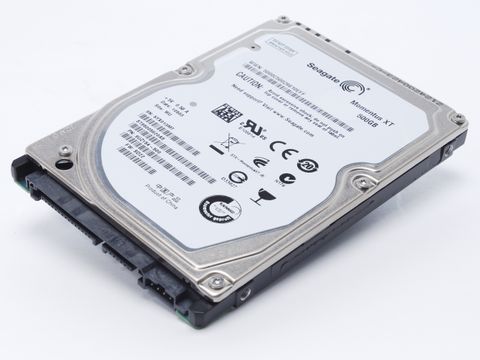Why you can trust TechRadar

Even without its hybrid status, the Momentous XT is unusually well specced for a 2.5inch notebook drive.
It has 500GB of space on its silvered platters, which rotate at 7200rpm. That puts it straight into the top tier of notebook performance, because most 2.5inch drives spin at 5400rpm.
In fact, it's much more akin to a desktop drive, because coupled with the large, fast magnetic design is a healthy 32MB DRAM cache for queuing up data operations.
The only vaguely disappointing part of the specs sheet as far as standard design goes is that the Momentous XT supports 3GB/s SATA transfers, rather than the newer, faster standard of 6GB/s.
This is not a traditional drive, though, and as well as the 32MB cache there's a 4GB NAND chip which is the hybrid part of the set-up.
That might sound like a stingy space allocation, but it's built with very fast single layer cell (SLC) technology rather than the more common but slower multi layer cell (MLC) chips which are used to create enough space in pure-bred SSDs.
The NAND storage is used only for read operations, but unlike previous hybrid drives, the Momentous XT doesn't need any extra drivers.
Seagate calls its controller 'Adaptive Memory' because like Windows Superfetch technology it learns which files you access most often and moves them into the solid state area to speed up common tasks.
This does mean that the magnetic platters are going to be in use most of the time, so you lose out on two of the major advantages of solid state drives: low power consumption and silence. The Momentous XT is no different to a normal laptop drive in either of these two metrics.
It is, however, good value for money.
At the time of writing, it's available for just £10 more than a 500GB 7200rpm notebook drive, and less than half the price of Intel's 80GB X25-M SSD.
Current page: Seagate Momentus XT 500GB - Architecture
Prev Page Seagate Momentus XT 500GB - Overview Next Page Seagate Momentus XT 500GB - Benchmarks
Copilot is everywhere in Windows 11 and it’s about to get harder to ignore – but is Microsoft in danger of wearing out the AI assistant’s welcome?

Microsoft has huge plans to expand its data center output to fuel AI boom

Netflix sets release schedule for Squid Game, Cobra Kai and more – but The Witcher has been cancelled
